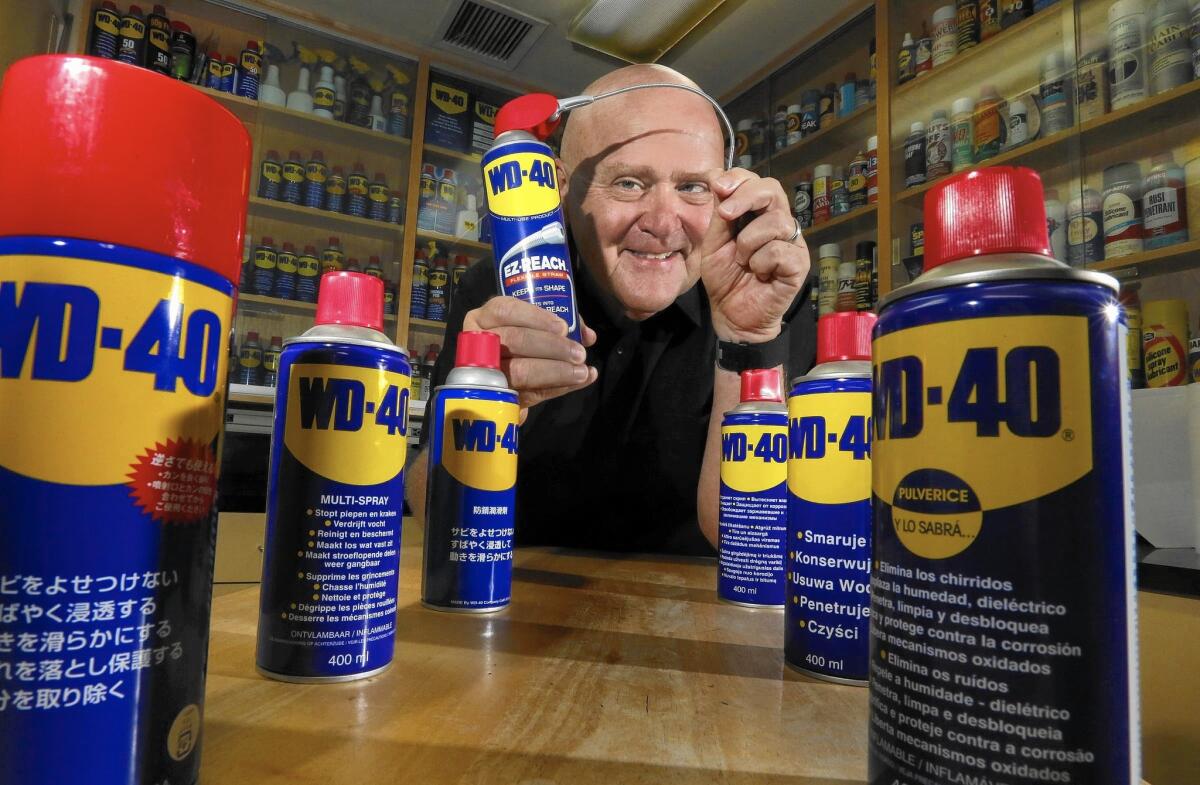Q&A: WD-40 CEO Garry Ridge explains company’s slick success

- Share via
Never mind smartphones, biotechnology and streaming video. If you wanted to handily beat the stock market over the last decade, you should have bought WD-40 Co.
The San Diego maker of the decidedly unglamorous WD-40 lubricant, rust protector and squeak eliminator keeps growing steadily, notably in foreign markets.
Its stock keeps rising in lockstep with its sales. While the benchmark Standard & Poor’s 500 index has gained about 70% in the last 10 years, WD-40’s stock is up more than 200%.
Sales totaled $383 million in its fiscal year ended last August. The company also makes 3-In-One oil, Lava soap and other products, but WD-40 remains its dominant brand.
So what is WD-40 doing that keeps, well, greasing the wheels? We asked its chief executive, Garry Ridge, to explain. Here’s an excerpt:
What does the name WD-40 mean?
It stands for water displacement, 40th formula. It was invented back in the 1950s to stop corrosion on the skin of the Atlas space rocket. The chemists who worked on it tried 39 times to find the right formula and on the 40th time they were successful.
The formula remains secret?
Yes, it’s locked in a vault in a bank on Rosecrans [Street in San Diego]. The original formula is actually written in pencil on a notepad.
How many employees do you have?
We have 101 in San Diego and 427 worldwide.
You sell WD-40 in how many countries?
176.
Where is the product made?
We only blend the concentrate, or the “secret sauce,” in four places: San Diego, Louisiana, the United Kingdom and Australia.
Aside from blending the concentrate ourselves, we outsource all of our manufacturing operations. Once the concentrate is blended it is shipped to our fillers, who mix in a few additional ingredients and put the completed formula into the famous blue-and-yellow can with the little red cap.
Many people use WD-40, put it on a shelf and then perhaps don’t buy another can for months or years. So how does the company keep growing?
Two ways: Today more than 65% of our revenue is outside the United States. Secondly, it depends who you are as a user. You and I probably use about 41 cents worth of WD-40 a year. But those working commercially or in factories are using between $40 and $70 of WD-40 a year. Our heavy-end users, such as artisans, repair-and-overhaul people, construction trades and automotive people, are using many, many cans a year.
How is WD-40 marketed?
We have a very simple set of questions we ask ourselves: Do you need me? Do you know me? Can you buy me?
WD-40 is a big brand globally, but in any particular sales channel it’s not that big. We don’t position ourselves as a lubricant or a de-penetrant or as a water displacer or as a rust-preventive product. We position ourselves as a multiuse product, which means we can go anywhere we want.
You can buy WD-40 in an automotive store, a hardware store, a grocery store, a drugstore. That’s the secret for part of our success.
The world and technology change so rapidly, but WD-40 seems to do well by mostly sticking to its knitting. True?
Focus is so important. You have to know what you understand and what you don’t understand. A lot of companies like to diversify but we call it “de-worsify,” where you keep looking for that shiny new penny because what we’re doing sometimes gets boring.
We’ve doubled our business in the last 10 years and we know we can double it again in the next 10. All it takes is focus.
You were once quoted saying “We’re everyday folks doing our job and making money for our shareholders.” What did you mean?
I don’t take myself too seriously. So often hubris and ego take over from reality. We are everyday folks. We say please and thank you. We respect people.
Profit is the applause of doing good work and having engaged employees, and that’s what I’m most proud of. The stock price will take care of itself.
Your website lists some strange ways people have used WD-40, like removing a python from the undercarriage of a bus. What’s your favorite story?
There was a lady in the Midwest who had bird feeder in her backyard and squirrels use to run up the pole and eat the bird feed. So she sprayed the pole with WD-40. Can you imagine those little squirrels trying to climb up that lubricated pole?
Twitter: @PeltzLATimes
More to Read
Inside the business of entertainment
The Wide Shot brings you news, analysis and insights on everything from streaming wars to production — and what it all means for the future.
You may occasionally receive promotional content from the Los Angeles Times.











